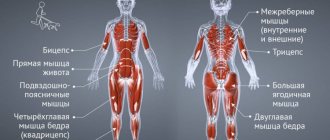The body needs to constantly increase the amount of energy expended, since after training, muscle tissue receives multiple microtraumas that need to be healed. In addition, all metabolic processes are significantly accelerated, which allows you to process food faster and leads to an increase in appetite. Moreover, this happens not only on days of training in the gym, but also during rest, because recovery also requires spending energy.
Disease
Remember school, when in the cold winter you were forced to go to class every day. Terrible, isn't it? But we found a way out and pretended that we felt very, very bad. Why not repeat this experience in adulthood.
A great excuse for training is faking illness. Call the coach and tell him that you feel terribly bad: your head hurts, your bones are aching. You may remember a sudden stomach ache. And the mentor will have no choice but to free you from physical activity for a few days.
Is it possible to skip a workout?
It is impossible to answer this question unequivocally, due to the fact that all people are different, for some a slight cough or fatigue is a reason not to go to training, for others it is a challenge to themselves, their self-discipline . That’s why we want to objectively highlight below the reasons why you can, and sometimes should, skip a workout, but what to do, of course, is up to you to decide.
Medical indicators
If you have a temperature , even low (37.2-37.5), you should not go to training. The body, by raising the temperature in the body, naturally wants to kill the virus that has settled in you, which is why many doctors do not recommend lowering the temperature to 37-38°C, that is, in order for the body to fight the infection itself.
Also, do not forget that if you have undergone surgery or have cured an illness, and your attending physician has prescribed you rest /lack of physical activity for the specified period in the discharge certificate/epicrisis, then this is a direct reason not to train, that is, to skip training.
Otherwise, if you go to exercise despite your doctor's advice, you are exposing your body to an increased risk of new injuries. Well, if you decide to visit the gym with a fever, then you will get nothing but aggravation of the current condition, as well as infecting other athletes, and there is no question of any supercompensation (take a break, save energy, because they are so necessary for fight the disease).
Athlete's medical indicators
Planned vacation
A person by nature cannot constantly demonstrate high athletic results. Therefore, there are periods when the athlete shows maximum strength, super sculpted form, and there are periods of rest when the nervous system and muscles are restored, the athlete takes two steps back, and then takes one step forward again.
As a rule, a short rest, in the form of 1-2 weeks , will not in the least hinder you from subsequently achieving your best athletic results. Typically, athletes take 1-2 weeks off after important competitions , as well as after completing a full training cycle (duration 4-6 months).
Scheduled break (rest) between workouts
Cloth
It's terrible, but you washed all your sports clothes in a new washing machine. Unfortunately, the modes in it have not yet succumbed to you, so the uniform fell victim to the high temperature. Alas, you can’t wear clothes two sizes smaller, and the psychological trauma from losing such expensive things will not allow you to burn calories during training.
Damaged clothes are quite suitable as an excuse not to go to training. But still, be vigilant and control the washing machine mode when washing things so that the imaginary reason does not become real.
How to stop skipping workouts
© Corbis/Fotosa.ru
Autumn is the most dangerous time for fitness enthusiasts of any level. If on a chilly November morning you want to jump cheerfully to training, and not die of boredom after gorging yourself on buns, congratulations - you are a representative of an extraterrestrial civilization. The same goes for autumn evenings - agree, they are ideal for tea and cookies. According to statistics from the International Fitness Association, we exercise on average 60% (!) less in the fall and winter than in the spring and summer. And, as you know, we eat more and, of course, gain weight.
We have already written about how to monitor your diet so as not to gain weight in cold weather - for example, in the articles “Seven Ways to Avoid Gaining Fat Over the Winter” and “Going into Sleep Mode.” Now we’ll tell you how to maintain a normal training regime.
The next time your inner voice whispers to you before a workout: “Let’s buy some goodies and binge on movies!”, ask yourself a few questions:
1. How many times did I exercise in the last week (month)? The trend here is important: if this is your first absence in a long time, you have the right to a day off. And if you have already accumulated five to seven days of break, you need to force yourself to work out. It will only get worse: the longer the pause, the more difficult it is to return to the gym. It is very convenient for self-organization to keep a training calendar.
2. Will I really regret it if I miss a workout? No, if you jump into a soft bed in the evening (and not into a cold pool), you will enjoy the first half hour. But repentance will come quickly. It is very important to remember this acute frustration! Naturally, it is much more pleasant to have pleasure right now than to give it up for the sake of a mythical bright future. Therefore, you need to create conditions in advance in which it is difficult to skip class: schedule and pay for personal training in advance, agree on going to the dance together with a friend. And think about this: you regret every time you missed a workout, but never the fact that you went to it.
3. How do I make up for a missed lesson? Immediately agree with yourself: training is not cancelled, it is rescheduled. If you intend to miss a class, figure out when you can make it up - in the morning, in the evening, during your lunch break? Knowing that the next time you will actually get to the gym only in a week is a good motivator.
4. Do I have a good reason? Sometimes canceling a class is truly the best solution. For example, if you get sick. Other excuses are usually unconvincing. I am very tired? After a day at the office, you are emotionally and mentally exhausted, but the load will not harm your body. I am hungry? Drink yogurt or eat a banana and you will have the strength to workout. I just don't feel like it? You may not want to at all, that’s no reason. Do I have a lot to do? You will have more time if you work out a little - you will have strength.
5. How will missing a class affect my fitness goals? If you are involved in body&mind programs or dancing, skipping one class is not so critical. But for losing weight and building muscle, every workout is important. By canceling today's bodyflex class, you will postpone the moment of meeting with a size 42 dress.
Plus, there are some great ways to avoid asking yourself these questions in the first place. Here they are:
1. Diversify your activities. “Again these monotonous body movements!” - this is a common reason for refusing fitness. Alternate Latin with belly dancing, yoga with Pilates, and an exercise bike with a treadmill.
2. Schedule personal training and have the instructor call you with reminders and threats. Or, for example, rent a room for self-study (and pay in advance!).
3. Pack your things in advance. If you go to a fitness club, prepare your bag in the evening and take it with you to work: after carrying your uniform all day, you will go to the gym as a matter of principle. If you're working out at home, put things in a visible place or even lay out a mat in advance.
4. Make friends. When pleasant acquaintances are waiting at a fitness club, yoga studio or dance school, training becomes much nicer. And the agreement “to meet in the locker room at 7.30” is obligatory.
5. Don't reward yourself. A reward—perfume, dessert, a movie—should be given for overcoming something unpleasant, right? As long as your fitness falls into this category, don’t expect success. Get used to the idea that the training itself is the reward. Your time for yourself, the opportunity to relieve stress and significantly improve your mood. We all know very well that 40 minutes of running on a treadmill relieves melancholy, anxiety and unnecessary thoughts much better than chocolate cakes. Make fitness your antidepressant! Then by skipping a workout, you will deprive yourself of a good mood.
Theft
Tell your coach a similar story: “While riding on the bus, there was a suspicious man standing next to me, not attracting any attention to himself. When he came out, there were no signs of trouble. But later it became clear that the man was a thief and took the wallet out of the bag.”
Unfortunately, now you will not be able to appear at the training session, because it is necessary to restore the imaginary cards that were in the wallet. This will take at least two days.
When is it prohibited to exercise?
Options that are not reasons for skipping workouts are one direction. But there are situations when continuing to exercise is simply dangerous to your health.
Let's figure out where to get an indulgence to skip training.
- Constant lack of sleep. If you sleep for 5 hours or less, or due to an emergency you did not allow yourself 7-8 hours of sleep, do not rush to train. This will increase the risk of injury or illness.
- Krepatura. The sensations caused by delayed onset muscle pain syndrome appear as a result of micro-tears in muscle tissue due to pumping. If you train at this point, there is a chance of serious injury. You can exercise, but attention should be paid to those muscle groups that have already rested.
- Catastrophic failure. It is fundamentally different from simple fatigue. If you can’t cheer up anymore, and you haven’t rested at all for the last 10-20 days, it’s better to return to sports after a good rest.
- Pain. If your foot or arm hurts, it’s time to stop training and don’t return to it until the cause is determined. This is basic self-care.
- Cough, wheezing. Distinguish from mild malaise and runny nose. In the latter case, sport helps, but if there is difficulty breathing, it will worsen the situation.
Assess your capabilities. Distinguish pain and a threat to the body from banal laziness. Strive for a healthy lifestyle and accept your reluctance to go to training as the small weaknesses of a normal person. By overcoming them, you will become stronger both mentally and physically.
In short, run to pack your sports bag! If everything is ok according to the 5 points described above, then you can train every day!
Business trip
The boss decided to please you and send you on a business trip to the Alps. You deserve it and, of course, do not refuse such a tempting offer. Call your coach and tell him this good news. He is also a human being, so he will be happy to let you go.
Don't forget to promise your mentor that you will study without him. He will probably be pleased to hear about your desire for an ideal body.
How quickly beginners lose shape
If you have just recently entered the world of fitness and for some reason are forced to take a break from training, you should not extend this period for a long time. The main key to achieving any fitness goals is consistency and regularity of training, and here it is very important not to lose momentum too early.
Loss of strength
The strength indicators of beginners are better preserved and recover faster after a break in training compared to athletes. And this is logical: the further a person goes from the usual level in his sports development, the more difficult it is for him to maintain himself at this high level, and accordingly, the losses in training are higher for any reason. And vice versa – beginners do not have much to lose compared to athletes. And science confirms this.
Let us turn to an interesting study conducted by Japanese scientists in 2011. During their experiment, 15 novices were divided into 2 groups. Both groups performed flat bench presses at a high level of intensity. At the same time, the first group trained for 15 weeks in a row, and the second, after 6 weeks of training, took a 3-week break and resumed training over the next 5 weeks. After 15 weeks, the scientists compared the results and found that in the end both groups of subjects had identical strength indicators.
Loss of aerobic performance
However, with aerobic indicators everything is exactly the opposite. There is quite a bit of research on this topic, but we found the following. According to the same Elizabeth Quinn, beginners lose their aerobic performance much faster than experienced athletes. The specialist refers to an experiment in which beginners leading a sedentary lifestyle trained on exercise bikes for 2 months.
After 8 weeks, the subjects showed significant improvements in the functioning of the cardiovascular system, and their aerobic performance also increased significantly. But as soon as the subjects took a 2-month break, the scientists found that all improvements were lost. As a result, the subjects completely returned to the level of aerobic capacity that they had before the start of training.
Problems with equipment
Everyone has had troubles when equipment breaks down at the most inopportune moment. Unfortunately, no one is immune from this, so all that remains to be done is to go to a repair shop.
A broken screen of a brand new smartphone, a cup of coffee spilled on a laptop, a broken tablet - all this is a reason not to go to training.
Agree, we all have at least once in our lives had a moment when we really didn’t want to go to training and had to literally drag ourselves to the gym. Most often, this is simple laziness or a desire to spend free time in some other way (usually such excuses appear in the summer, when it is warm and pleasant outside).
But there are reasons why it is really better not to train on this day. It is important to be able to distinguish between far-fetched reasons to skip training from truly valid excuses. Today we will talk about valid reasons for skipping training. So, when is it not a sin to stay home:
1. High temperature
A high body temperature always indicates that something is wrong with your body. Usually this is evidence of either a viral (bacterial) infection or an acute inflammatory process.
In any case, you need to not only bring down the temperature, but also understand the reason for its occurrence. You should not go to training immediately after your temperature drops, even if it suddenly drops without medication.
Now your body has clearly begun to fight something, and it needs strength and energy to restore and strengthen the immune system. Therefore, do not waste energy during training, let all reserves go to protect the body.
2. Cough, hoarseness of voice
Sports help to quickly rehabilitate only if you have a slight malaise and a slight runny nose/sore throat. In this case, the acceleration of blood during training allows you to strengthen the body’s protective functions and prevent serious illness.
But if it is already useless to carry out prevention, you have a decent cough, a hoarse voice and difficulty breathing, then under no circumstances should you go to training - this will only worsen your situation.
3. You didn't get enough sleep
If your night's sleep was barely 5 hours, you ate and woke up and felt some weakness and drowsiness all day, then it is better to leave thoughts about training. Even one lack of sleep seriously undermines the body’s protective and adaptive properties: stress levels increase, appetite increases, and a lack of energy is felt.
Training will only take away the already draining strength and energy, which will increase the risk of cardiovascular diseases and pathologies.
4. Your body has not had time to recover properly
If the burning sensation and pain in the muscles from the previous workout still have not gone away or have not noticeably weakened, it means that your body has not yet had time to properly recover. Soreness, or acute muscle pain, affects everyone differently, so it's okay if you postpone your workout to the next day.
Everyone knows that these unpleasant sensations in the muscles are the result of microtrauma during intense exercise. This is partly good because it leads to the growth of muscle tissue and makes you stronger.
However, if you start training when these micro-tears in the muscles have not yet healed, you can easily get a sports injury. An alternative option could be to train a different muscle group: for example, if your biceps still hurt, then try doing a workout for your legs, chest or back this time.
5. Your feet hurt
If you are regularly bothered by the same characteristic pains, then this is a reason to consult a doctor and postpone training for a while. Sometimes foot pain is a sign of simple muscle strain. But it happens that such pain occurs as a result of cracks or micro-fractures.
Foot pain can be caused by a heel spur or plantar fasciitis. Typically, with such diagnoses, pain is felt in the heel, which intensifies with the load on the leg. In this case, it is better to immediately stop training and make an appointment with a specialized specialist (orthopedic doctor, traumatologist, surgeon).
6. You have no strength at all
If you are extremely tired, you feel extremely exhausted, and this is not just regular exhaustion at the end of the working day, then it is better to postpone the workout.
In such a depressed, lethargic state, you still won’t be able to train properly, and trying to tone yourself up when you’re completely exhausted is also not the best idea. Therefore, don’t go to the gym today, but in the free time, think about your lifestyle.
If your life is not compatible with sports or fitness, then you are definitely not living the way you should. Change your lifestyle quickly before you become hostage to chronic fatigue and depression.
7. Your knee hurts a lot.
Sharp knee pain and clicking can be a sign of injury, such as a slipped or torn meniscus, a dislocated kneecap, osteoarthritis, or osteoarthritis.
You shouldn’t joke with such diagnoses, so if you have regular knee pain, you should immediately go to a trauma surgeon. In mild cases, conservative drug therapy will help, but sometimes surgery is required. The main thing is not to start the problem!
8. Your lower back hurts a lot.
Lower back pain may indicate incipient osteochondrosis, problems with the spine or joints, displaced spinal discs, age-related osteoporosis and other problems.
Guessing the reasons won’t help much here either - it’s better to go to a vertebrologist or osteopath. Timely treatment will ease the pain, and the doctor will tell you how best to train so as not to harm, but rather to help yourself.
9. Women have pain in their ovaries
If it is not symptomatic pain on certain days of the menstrual cycle (for example, on the day of ovulation or on the first day of menstruation), then it is worth considering. Sharp pain in the ovary can be caused by a follicular cyst or corpus luteum cyst. In both cases, you should not train until the cyst resolves.
Training in spite of this can lead to serious consequences, in particular, rupture of the cyst, damage to the ovary and emergency surgery. Better take care of yourself and find out the cause of such pain. Many problems with the ovaries can be successfully resolved with the help of hormonal therapy. Find out about its need from your gynecologist.
Of course, there may be other good reasons not to go to training. Just listen to your body and learn to trust it. And let there be as few such reasons in your life as possible.
Thank you for taking the time to read this material. We appreciate your attention as it inspires us to prepare more valuable articles for you.
If you enjoyed this article, we hope you'll take a couple more seconds to give us a like. And we are really looking forward to your opinion in the comments about whether you have ever missed training for good reasons?
You may also be interested in the following materials:
THE MOST UNPLEASANT CONSEQUENCES OF TRAINING
HOW TO GET RID OF NECK PAIN: EXERCISES AND TIPS
HOW TO PREVENT YOUR KNEES FROM INJURIES: STEP-BY-STEP SET OF EXERCISES
HOW TO TRAIN IF YOUR BACK HURTS
Support from a loved one
We all have loved ones whose well-being comes first for us. Of course, there is no need to invent non-existent diseases for them. But won’t you rush over and support your sister, who has finally organized her own exhibition in a local art gallery? Your coach will have to come to terms with and understand that family and loved ones come first.
Now let's talk about ridiculous and absurd excuses for training. Although even with these reasons in your arsenal, there is hope that the coach will understand and forgive you.
How quickly experienced athletes lose shape
It is much easier to regain lost levels of fitness if you have been training regularly for a long time. Simply put, if you've been consistently training 3-4 times a week for over a year, your muscle memory and endurance will be better than that of a beginner.
It is also important to emphasize that loss of fitness can worsen at different rates depending on what type of training you do - strength training or cardio.
Loss of strength
Most experienced athletes begin to lose strength after 2-3 weeks of stopping training, but this also depends on the conditions in which the body is located during the break. If you are sick and your body is under stress, you will begin to lose strength after 2-3 weeks. If you are healthy and move enough, a significant loss of strength indicators will begin to be felt only after the 4th week.
In 2001, the journal Medicine in Science and Exercise, published by the American College of Sports Medicine (ACSM), published a review of several studies that examined the extent to which taking breaks from training affected the strength performance of runners, rowers, and strength athletes. All groups of trainees showed a minimal decrease in strength indicators even after the onset of the 4th week without training.
However, the following feature was noticed: while the overall strength indicators practically did not decrease, specific muscle fibers of the athletes began to noticeably lose strength. In endurance athletes, most of the “slow” muscle fibers (those responsible for high repetitions) have lost significant strength. In strength athletes, the same changes were observed in type II fibers (responsible for strength).
Loss of aerobic capacity
According to sports medicine expert Elizabeth Quinn, the loss of aerobic capacity occurs quite quickly in experienced athletes. The specialist mentions a study in which experienced athletes, after a year of training, stopped training completely for 3 months. As a result, scientists found that over 3 months, athletes’ endurance levels decreased by as much as 50%.
Also in 1985, scientists from Denmark conducted an experiment in which 9 experienced athletes training in an aerobic style participated. Before the experiment, participants allocated 6 to 10 hours per week to endurance training. During the trial period, their training was reduced to one high-intensity 35-minute session per week. After 4 weeks, the athletes' endurance levels decreased by 21%.
But don't get discouraged, because as strength and conditioning specialist Molly Galbraith says, although endurance levels drop more than strength, experienced athletes return to their previous levels faster.
Housework
Washing, cooking, cleaning, caring for flowers, etc. are incredibly exhausting. And if you think about it, after doing all these household chores, you well deserve a day of not working out.
But if you think about it, loading dirty clothes into the washing machine, putting food on your plate and your household, watering flowers, burns hundreds of calories per day. And it is not clear what is more effective: one day as a housewife or training in the gym.
Why you shouldn't skip workouts
Everyone knows that skipping workouts and disrupting the training process is, of course, bad. And many don’t even think about it and have no idea why. We will try to understand this issue and highlight the main points for ourselves.
So, for example, you started training 2, or maybe 3 times a week - it doesn’t matter. The important thing is that you begin to give your body physical activity with a certain amount of effort and frequency, and your body gets used to it. The body began to adapt to these loads. This, in turn, is called training. The better your body is adapted to certain physical activities, the better trained it is.
In addition to all this, the average amount of energy consumed per day for your body also increases. It is extremely important to understand that you spend more energy per day not only on the day of the actual workout, but also on those days when you also rest. After all, all this time, restoration processes in the body are continuously occurring. Which also require the efforts and efforts of the body!
And since your energy consumption has increased, the amount of energy consumed also increases. Your appetite increases and you need more energy. Of course, this entails an acceleration of metabolism.
It seems that everything is becoming clear and falling into place, let’s take a closer look at the consequences of skipping training, using specific examples.
If you are losing weight or drying out!
You have already clearly realized that each of your workouts keeps you in good shape and does not allow your metabolism to relax, maintaining the body systems at the proper level.
So, if you missed another lesson and did not spend additional energy. That is, your energy expenditure has decreased to the original level (the body has already recovered, but there was no new training). But the metabolism accelerates and slows down not in 1 - 2 days, but it happens several times slower.
In other words, this is what happened: you began to spend less energy, but your appetite remained the same, since the decrease in metabolism had not yet occurred. This means that you continue to consume calories in the same amount, which is fraught with unpleasant consequences. But, since the body already needs less energy, it will definitely store the excess as fat.
For example, you missed a workout and, for about 1-3 days, your body will slowly gain excess weight. If you miss 1 workout every few months, it's definitely okay. But if you miss 3 - 4 or more workouts per month, then the effectiveness of your efforts may be almost zero. It looks like a step forward and immediately back, but it’s easier to run in place.
If you are gaining muscle mass
In this particular case, many will want to argue that in this case it is much simpler. But that was not the case, there are other important factors and features that need to be taken into account and taken into account.
After you have actively trained, it is clear that the body recovers for several days. And then, for a short period, approximately (2 - 4 days), the “super-recovery” phase comes. This means that during this particular period your muscles become stronger, more resilient or larger. Depending on the focus and emphasis of your training.
So, ideally, the next workout for these muscles should be carried out precisely in this phase. Since after it (if the muscles have not received the load again) a decline occurs, to a very sad and initial level.
As many of you know, it is better to train separately for mass. At each workout, work one or more muscle groups. And so on until you reach and pump up all the muscles in a week.
Now, let's say you accidentally missed 1 lesson. What to do now and how to escape?
If you complete a previously missed task at the next training session, then all the others will automatically move forward. But the body is already getting used to a certain rhythm and energy consumption. In this case, there is a danger of missing phases - supercompensation.
If you simply skip the missed workout, then you will 100% miss the supercompensation phase for that muscle group. But the order of other training will be maintained.
IMPORTANT TIP:
If you miss a maximum of 1 workout per week, then you can safely ignore it and worry about the consequences.
If this becomes more routine (several times a month), then perform the missed workout, thus shifting all the others.
Now, we have understood a little about the intricacies of these processes. It is important to understand that for working on mass it is critical and absolutely important not to skip training, so as not to miss the supercompensation phase. Otherwise, it will be a “step back” at least for those muscles that you missed.
Let's sum it up!
Success in any endeavor is achieved through uncompromising work, dedication, drive and consistency. This is when you spend the same amount of effort in one unit of time. That is, you act clearly and steadily, without deviating from the path. This principle is fundamental not only for training, but also for any of your life endeavors!
Bad dream
Here you can find several options to solve the problem:
- You had nightmares. Now, like after watching a cult horror movie, you are afraid to even leave your apartment, because a maniac might be waiting there. Don't risk leaving the room.
- Lack of sleep. This is a more serious reason to skip a workout. Lack of sleep has a detrimental effect on the body and prevents it from functioning normally.
And now about serious things
If you're reading this article, you're probably tempting yourself to skip your workout. Remember that the path to health is not easy. You will face trials there. And the main test is laziness. Don't let it take over your desires and aspirations.
There are only two truly forgivable, valid reasons for skipping a workout:
- Serious illness.
- Death.
Only in these two cases can a conscience be clear, because in the first case physical activity is contraindicated, and in the second case it is impossible. In all the rest, you can find a way out.
No one obliges you to work out in the gym with a trainer. Obviously, not everyone can find the time and money for this. However, everyone can afford, for example, to wake up half an hour earlier than usual and do morning exercises.
If you can't bear the thought that charging will take up half an hour of your precious time, then sacrifice something else. For example, if, according to tradition, you watch a movie every evening, then combine business with pleasure: watch and study.
Know that to become a successful person you need health. Train and improve. Only occasionally allow yourself days of relaxation, but on condition that you are sure that tomorrow your training will continue.
Iron Health
We all know that skipping workouts is undesirable. However, few of us understand exactly why this is undesirable. In this article we will examine the issue of skipping workouts from the point of view of physiology and the effect on the body. After all, speculation and motivators are one thing, but accurate scientific knowledge is something completely different.
The basis of progress is adaptation
The development of any physical parameter of a person is a process of adapting it to a certain type of load. The body has the ability to develop and improve, but only if such a need exists.
Regular training for mass or strength forces the body to adapt to this load, increasing both the muscles themselves and improving the mechanisms of their energy supply. Over time, this causes you to become stronger and your muscles to become larger. Ultimately, you'll be able to push through the load more easily, and you'll be able to add more to your normal lifting weight. Thus, progress in the gym is the body’s constant adaptation to a certain regular physical activity.
What happens when you miss training?
Any missed workouts in the gym disrupt the regularity of receiving a certain type of physical activity. Ultimately, the process of adaptation of muscles and the body is disrupted, which negatively affects progress. Surely everyone in the gym has athletes who, although they train for a long time, allow themselves to attend training irregularly. As a result, despite considerable training experience, they have very mediocre indicators both in strength and muscle quality. This is logical, because there is no point in the body adapting to a load that occurs from time to time.
Every time after training, the body and muscles include recovery and adaptation processes that are aimed at being better prepared for repeated stress. However, if it does not happen (you suddenly decide to skip the workout), there will be a rollback to the previous state. Thus, you will be in a constant state of gaining your optimal shape, with virtually no progress. Simply put, for every step forward you will respond with a step back. It is clear that there is no point in talking about any more or less significant results. They can only be with significant farm support. However, the worst thing is that skipping classes develops the bad habit of skipping the gym - on a subconscious level, you are initially ready not to go to train, which means you will do it at any opportunity.
Correct conclusions
The basis of progress in the gym is regular training. If you do not have a goal to develop any physical parameters, but just want to meet and communicate with interesting people, then you can safely skip training - anyway, in the form in which they are now, they are of no use.
If you want to work for results, improve the strength and beauty of your body, then skipping classes should be a thing of the past. Every time you decide to skip a workout, you must understand that you will thereby delay your own progress in the gym, which will be impossible to catch up with. After all, time has already been lost, and the body’s adaptive capabilities are very limited.











